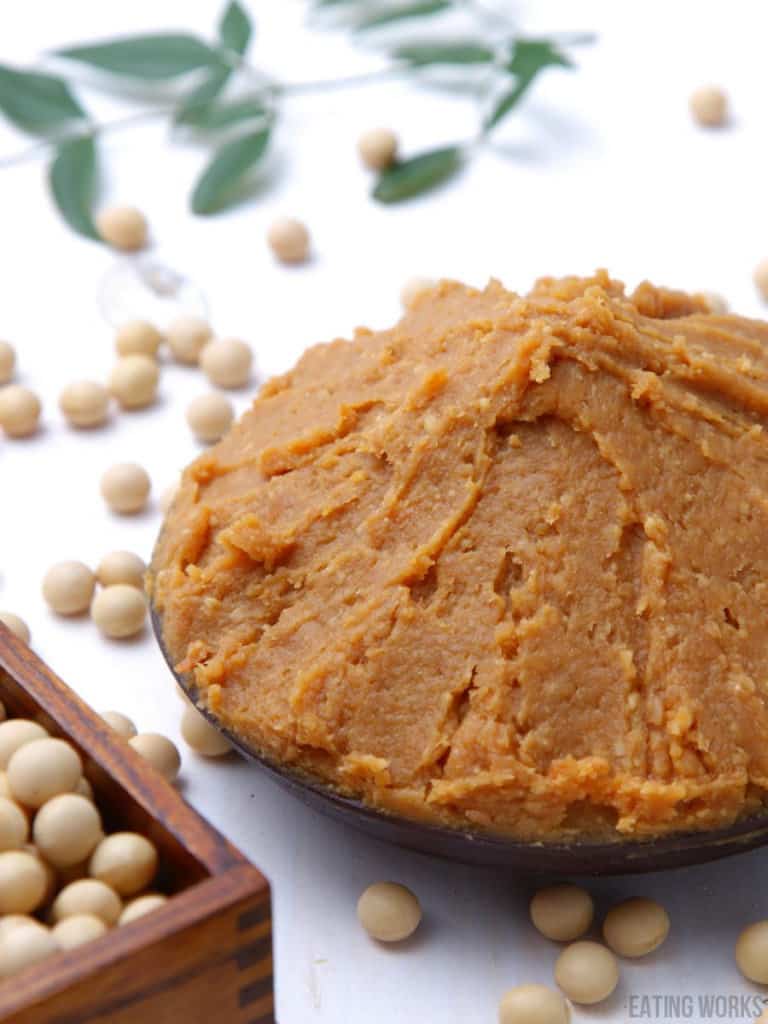Is Tomato Soup Easy To Digest?
“Is Tomato Soup Easy To Digest?” This is a question I get a lot from my readers. If you have a history of gut issues, IBS, Colitis or Constipation or if you follow a gluten free diet you may be wondering the same thing. I get tons of questions from readers on my Gluten Free Tomato Soup Recipe including:

- Is tomato soup easy to digest?
- Is tomato soup hard to digest?
- Does tomato soup cause gas and bloating?
- What kind of tomato soup is the easiest to digest?
- What kind of ingredients in tomato soup should I avoid if I have a gluten intolerance or if I’m allergic to dairy?
In this post I’m going to answer these questions in as much detail as possible. So that you will have a better understanding if you can digest tomato soup or not. And if you can’t then you’ll at least know why. I will also go over ingredient swaps that will make tomato soup easier to digest.
Is Tomato Soup Easy To Digest?
Yes, tomato soup is easy to digest! If you have a history of constipation, gas, or bloating, a bowl of tomato soup will deliver the satisfaction and nutrition you need. Without the explosive aftermath. Since tomato soup is pre-digested through blending, moisture rich, and cooked it’s easy on the stomach.
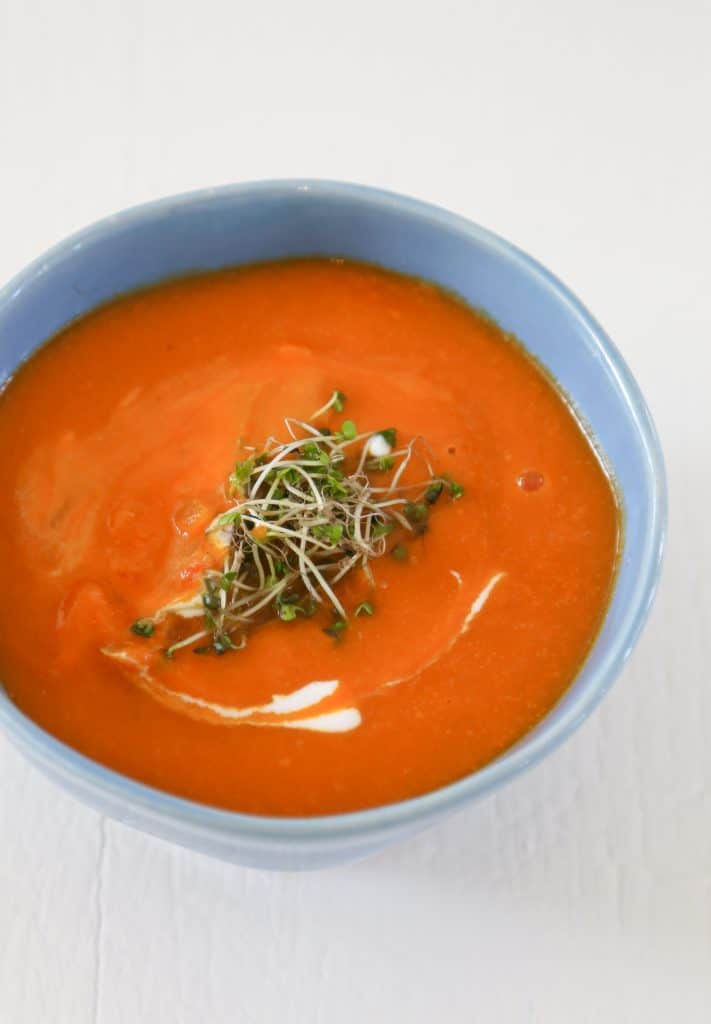
Are Soups Better For Digestion?
The reason I have so many dairy free soups on my website that are pureed is because they’re great for people who suffer from gut issues like constipation, IBS, celiac, Crohn’s disease and colitis. Soups are easy to digest because they’ve been predigested by the cooking process.
Heating the ingredients up to a high temperature breaks down the fiber and cellulose which makes the vegetables easier to digest. Many people who have trouble digesting the roughage in vegetables have no problem digesting vegetables that have been cooked down into soups.
Vegetables can either be made easier to digest in soups by only cooking them down or by blending them. When vegetable are blended into soups they are masticated the same way they would be in your stomach.
By pulverizing the fiber in the vegetables before they are consumed takes a lot of the mechanical responsibility of digesting the vegetables off of the digestive system. The digestive system can then focus on mixing the liquid ingredients with digestive juices, stomach acid, enzymes and probiotics. Which will facilitate the chemical process of breaking down the nutrients so that they can be absorbed.
In addition, mixing the ingredients in tomato soup with liquid ingredients like vegetable stock or water adds moisture to the bowl. The added moisture helps moisten waste products in the intestine so that the peristalsis (muscle contractions in your digestive system) can move waste through the intestine more easily. This is especially helpful to those who suffer from constipation or IBS.
Who May Have Trouble Digesting Tomato Soup and Why
The only reason tomato soup would be hard to digest is if it has dairy from cows in it. Dairy from cows contains a large casein molecule which makes it hard to digest. The large casein molecule in addition to the lack of lactase enzymes the body needed to break down the milk will cause stomachaches and other symptoms in those who have a dairy sensitivity.
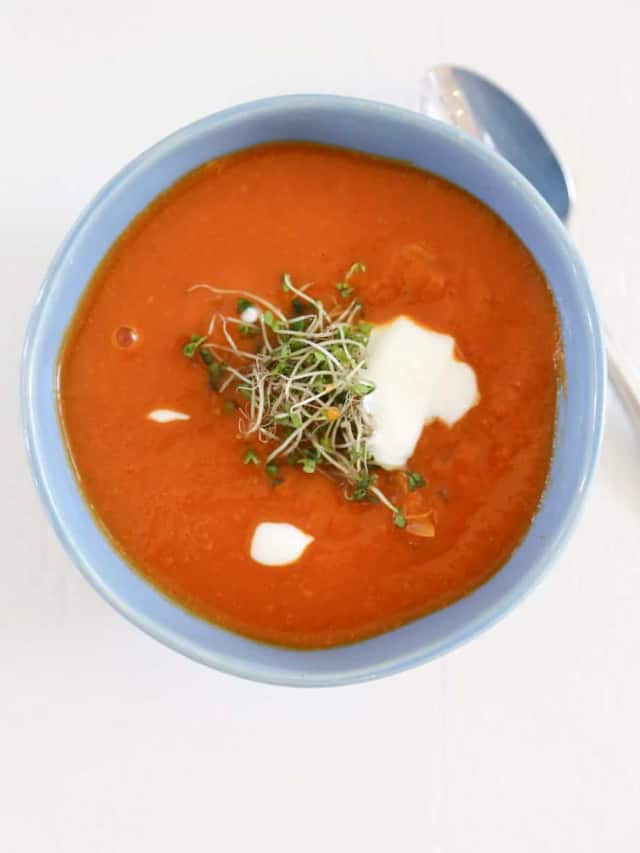
Does Tomato Soup Cause Gas And Bloating?
Another reason tomato soup may be hard to digest for some is if an auto-immune disorder is present and the person is sensitive to nightshades. People who are sensitive to nightshades can’t digest them fully which can cause gas and bloating.
There are 2,500 varieties of nightshades that are considered to be healthy for most people. Some compounds in nightshades that can cause auto-immune disorder flair ups include Solanine, Lectins, Saponins and Capsaicin.
These compounds are harmless for most people but for some who need to follow an anti-inflammatory diet they can cause the following adverse reactions:
- Lectins can contribute to leaky gut syndrome.
- Capsaicin in peppers can be irritating to the intestinal wall.
- Solanine in high doses can stress the body and lead to increased inflammation causing flair ups.
- Saponins can cause an exaggerated immune response that will lead to an auto-immune flair up.
So if you have an active auto-immune disorder like fibromyalgia and are currently experiencing frequent flair ups I would stay away from tomato soup until you get better.
In Summary
If you have auto-immune disorders, chronic inflammation or a sensitivity to lectins, solanine, saponins or capsaicin, tomato soup could be hard for you to digest and cause gas and bloating!
Is Tomato Soup Bad For You?
Tomato soup is very healthy for you! The 4 reasons tomato soup could be bad for you include:
- If you are sensitive to nightshades.
- Canned tomato soup is highly processed and has too much SODIUM which is bad if you have kidney disease, high blood pressure or heart disease.
- If it has gluten in it and you have a gluten sensitivity.
- Or if it has milk in it and you have a dairy sensitivity.
Other than those four reasons tomato soup is actually really good for you!
What Are The Health Benefits of Tomato Soup?
It should just be common sense that tomato soup is good for you. But I can’t just write a blog post saying tomato soup is good for you, just because. That doesn’t even work on my daughter. So upon researching WHY tomato soup is good for you I came across these reasons. According to Healthline, tomato soup is good for you because it is:
- Rich in nutrients
- Stuffed with antioxidants
- Promotes healthy skin
- Supports good vision
- Supports bone health
- Prevents heart disease
- Boosts fertility
- Enhances bone health
For more details check out the original article on healthline!

What Soups Are Easy To Digest?
Generally speaking soups are one of the easiest foods to digest. However some soups go down easier than others. While some soups may leave you feeling heavy and bloated others will help you feel light and energetic!
Soups that are easy to digest are:
- Probiotic rich soups with miso
- Dairy free soups other than grass fed butter
- Gluten-free soups
- Soups without beans and lentils
- Soups made with vegetable stock over chicken or broth stock
- Blended soups are easier to digest than stews
- Soups without pasta
- Soups without heavy cream
- Soups without milk
- Soups made with sweet potatoes or cauliflower instead of white potatoes
Examples of Easy to Digest Soups
In the section above I went over 10 types of soups that are easy to digest. Here are a few examples of soups that are light on the stomach.
- Keto and Gluten Free Miso Soup
- Gluten Free Ramen Noodle Soup
- Gluten Free Tomato Soup
- Gluten Free Cream of Mushroom Soup
- Vegan and Gluten Free Curried Cauliflower Soup
- Simple Spring Pea Soup
I developed all of these soup recipes for my clients who suffer from digestive disorders. I personally have leaned on these recipes over the years during Candida flair ups and when my IBS is bad.

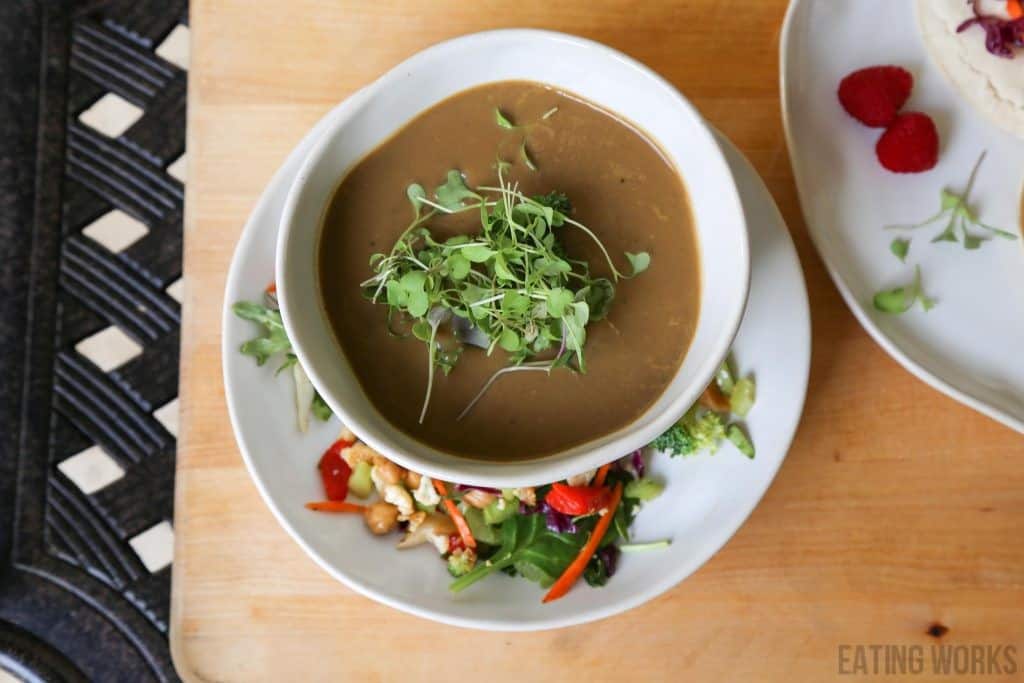
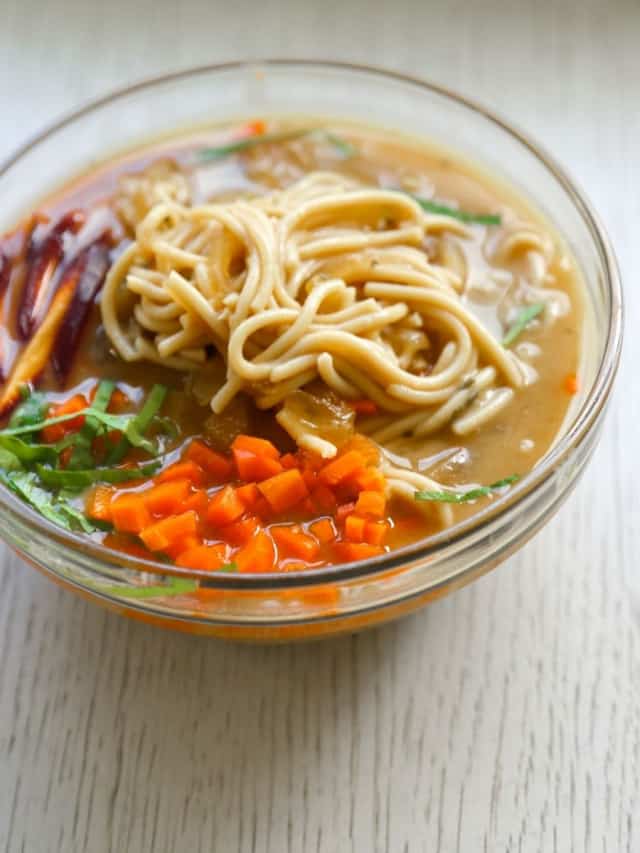
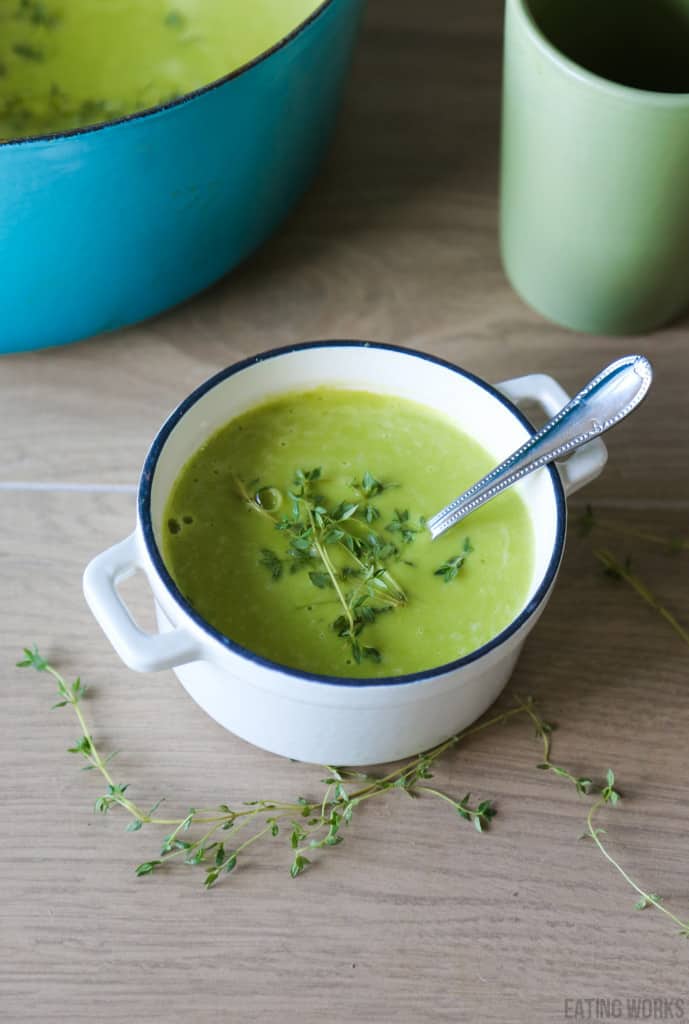
Is Tomato Soup Good For Gastritis?
Tomato soup can be soothing for the intestinal wall for those who have gastritis.
Is Tomato Soup O.K. for Diverticulitis?
Yes, tomato soup is good to eat during diverticulitis flair ups because it is pulverized and doesn’t contain pips or tiny seeds that can get caught in one of the tiny herniations in the intestine caused by diverticulitis.
If you have diverticulitis it’s important to minimize gas and bloating. Eating tomato soup on an empty stomach can help provide the nutrients you need without risking adverse reactions associated with your diverticulitis symptoms.
How Long Does it Take to Digest Tomato Soup?
According to food combining rules vegetables take one hour to pass through the stomach and liquids take 10 minutes. So a pureed food like tomato soup actually takes 30 to 40 minutes to digest. This means it’s best to eat tomato soup as a first course on an empty stomach.
Eat the more solid portions of your meal after the soup. Mixing tomato soup with something like a burger which takes longer to digest will delay the digestive process and cause gas and bloating.
Is Tomato Soup Gluten Free? What’s A Good Gluten Free Tomato Soup Recipe?
Most tomato soup is gluten free including my recipe for gluten free tomato soup. However, you should always check labels if you are buying pre-made tomato soup. Luckily, if you live in the United States foods must be labeled that they contain wheat to be legally packaged – if they have it.
Many companies won’t label foods as gluten free if the food is considered to be universally gluten free. Tomato soup is considered universally gluten free by many people. According to the Food and Drug Administration, a food must contain less than 20 ppm (parts per million) to be labeled as gluten free.
Tomato soup digest google web story!

FREE 7 Day Gluten Free Meal Plan
A meal plan designed to jump start whole body healing and support digestive health……
…And get the latest recipes!





